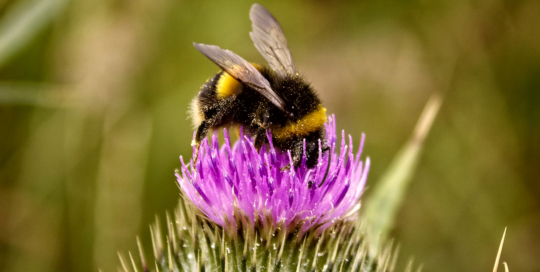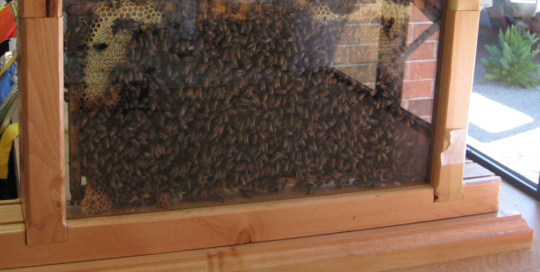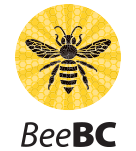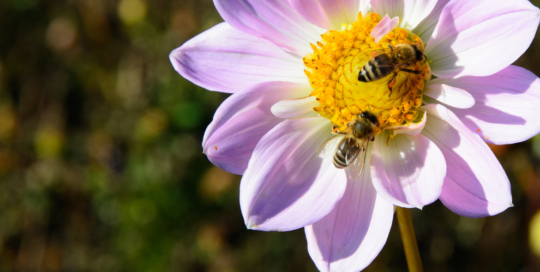Varroa mites continue to plague beekeepers in BC resulting in colony losses, but groups like the Comox Valley Beekeepers Association continue to look for methods to reduce the mites. Previously effective methods like using chemicals such as Apivar are becoming less effective as the Varroa mites grow resistance. As part of their 2023/24 Bee [...]

Native BC Bee and Forage Plant Identification Project
Christine Cooper2024-04-05T15:48:53+00:00Many recognize the honey bee as a pollinator in British Columbia, however; the province is home to nearly 600 species of bees. The Native Bee Society of BC (NBSBC) is striving to collect more knowledge about the nearly 600 species of bees found in BC. With the success of their 2022/23 Bee BC project, [...]

Community Varroa Treatment Kits Prove Effective
Christine Cooper2024-04-11T15:17:07+00:00The BC Honey Producers Association (BCHPA) is helping smaller bee keeping operations address Varroa mites as part of their 2023/24 Bee BC project. For their project, the BCHPA created Oxalic Vaporizer supply kits to enable the borrowing of treatment equipment. The Oxalic Vaporizer treatment method has proven to be effective but comes at a [...]

Enhancing Bee Forage Resources
Christine Cooper2024-03-22T16:46:32+00:00The Native Bee Society of BC (NBSBC) completed a 2022/23 Bee BC project that focused on training master melittologists in identifying and recording bee forage information. This included researching bee forage and creating reference collections. The goal is to share those reference collections at community outreach events to encourage people to plant bee forage [...]
Education & Bee Awareness
kstiles2020-12-07T19:02:57+00:00In 2019, the Bee Awareness Society completed a project to create an education program in local schools. Here's a summary of the project: Summary of Achievements: We successfully implemented and completed our full curriculum for the Bee Awareness Full Day Education Program to all three schools. The children were educated through stories, games, [...]

Bee Numbers Blossom on Kootenay Conservation Farm
kstiles2020-12-07T18:37:56+00:00In the increasingly complex landscape today’s pollinators must navigate, mounting pressures from food and habitat shortages continue to exact a sizeable toll on both domesticated honey bee and wild bee populations. Fortunately, BC natural beekeepers like Kate and Ryan are doing their best to bolster bee numbers! Since 2017, the pollinator-loving pair has been propagating [...]

West Kootenay Schools Abuzz With Observation Hives
kstiles2020-12-07T17:45:01+00:00The Bee Awareness Society is thrilled to offer a “live learning tool” to local schools in the West Kootenays. Using observation bee hives, the Society teaches students about the vital role that honeybees and other pollinators play in food production. “There are fewer honeybees, bee species and other pollinators available for pollination,” project coordinator Linda [...]

Nanaimo Students Discover The Bees Needs
kstiles2020-10-28T17:51:25+00:00It’s been a busy summer for Morgan Creek Farm as they embarked on their bee education and planting project! Together with local students, the Nanaimo family farm has transformed a previously sparse pasture into a thriving habitat for pollinators.For farm owner Aaron Grant, the project began as a way to teach local residents about “the [...]

Student Outreach Initiative Builds Urban Bee Habitat
kstiles2020-12-03T17:44:28+00:00There are close to 3,000 farms and hundreds of community gardens in Metro Vancouver that rely on native bees for food crop yield and quality. But with native bee populations declining across North America, Metro Vancouver is at risk of becoming one of many communities to face the challenge of [...]

Meadow Restoration Helps Enhance Forage For Victoria Bees
kstiles2020-11-12T21:53:47+00:00In return, these pollination powerhouses rely on nutritious and diverse forage, the decline of which has resulted in poor honey bee health and reduced native bee populations. While establishing pollinator habitat around farm operations can help increase bee resistance to parasites, disease and the effects of pesticide exposure, there is poor uptake in most [...]




